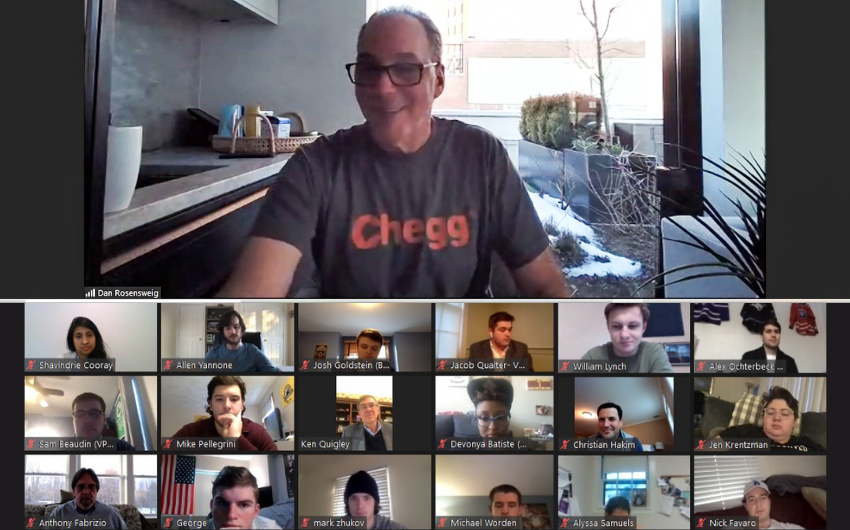
TOPICS:
Seeking fulfilling work and showing up to a job as one’s authentic self is the key to career success, says Dan Rosensweig, chairman and CEO of Chegg, a leading provider of digital learning services for high school and college students.
For more than an hour in a Zoom presentation on Wednesday afternoon organized by the Business Students Association (BSA), Rosensweig answered questions from Curry President Ken Quigley and Curry students sharing reflections from his career as the current CEO of Chegg and ex-COO and CEO of Yahoo! and Guitar Hero.
Students should seek a job that excites them, says Rosensweig. “There are parts of every job that suck,” he says. “If you get into an environment that you love and you get a great boss, you will kick ass. There’s always going to be a bad day. It's easy to quit when you don't like what you're doing. It's harder to quit when you like what you're doing.
The virtual event this week served as a finale to the BSA Distinguished Speaker Series which featured virtual events throughout the fall and winter with speakers from all over the world within education technology, marketing, journalism, accounting, consulting, and investment management.
Before the formal talk, students from the BSA, Accounting Club and DECA Club had a smaller virtual reception with the high-profile CEO. Students also had time to speak with Justin Tuck, a colleague of Rosensweig, who also attended the virtual event. The former NFL player is now a vice president in Private Wealth Management at Goldman Sachs. As part of the discussion, Tuck answered questions from students on his success in football and finance.
Throughout the event, students gained critical career advice from one of Silicon Valley’s most influential CEOs. “It doesn’t matter the size of the company – pick the culture and the location you want. Find a great boss in the industry that you think you care about and attach yourself to it. Sheryl Sandberg once said don't worry about if you can do the job – hook yourself to a rocket ship.”
One should never try to succeed in business by emulating someone else, Rosensweig says.
“I did not really start to achieve success in my life until I accepted who I actually was,” he adds. “I am not a founder. I didn't go to business school. I didn't go to an Ivy League school. I'm a salesman. I happen to love people and I'm a good storyteller.”
“Do your own path, your own work. Be positive, be collaborative, be willing to take a chance. There are no possibilities when you say no. There are possibilities when you say yes. And even if the yes didn't get you where you thought it was going to go, it's going to get you to another place. Deal with problems not as brick walls, but speed bumps.”
During job interviews, Rosensweig says employers are looking for “attitude. They're looking for the ability to learn. They're looking for willingness to commit.
“Be your authentic self. Do the work before you get there. Know what you're interviewing for, what the job does, what's expected of the job, know who the boss is. Represent yourself as somebody who can do it. Help them understand you bring solutions, not problems.”
“I found it interesting to hear Mr. Rosensweig talk about his experiences as both a mentee and a mentor. He said that we cannot just rely on our network and that mentors will only help you if you help yourself,” says Dr. Shavi Cooray, associate professor of Management Information Systems.
In a mentoring relationship, Rosensweig notes that a mentee “has to commit to actually being willing to listen to what the person says to you openly and without defensiveness.”
The goal of a mentoring relationship is to make a mentee’s life better and more successful, Rosensweig adds.
“Don’t expect mentors to do for you if you're not willing to do for yourself,” he says. “Like all things you learn in life, you can blame anybody you want. But at the end of the day, it's your journey.”